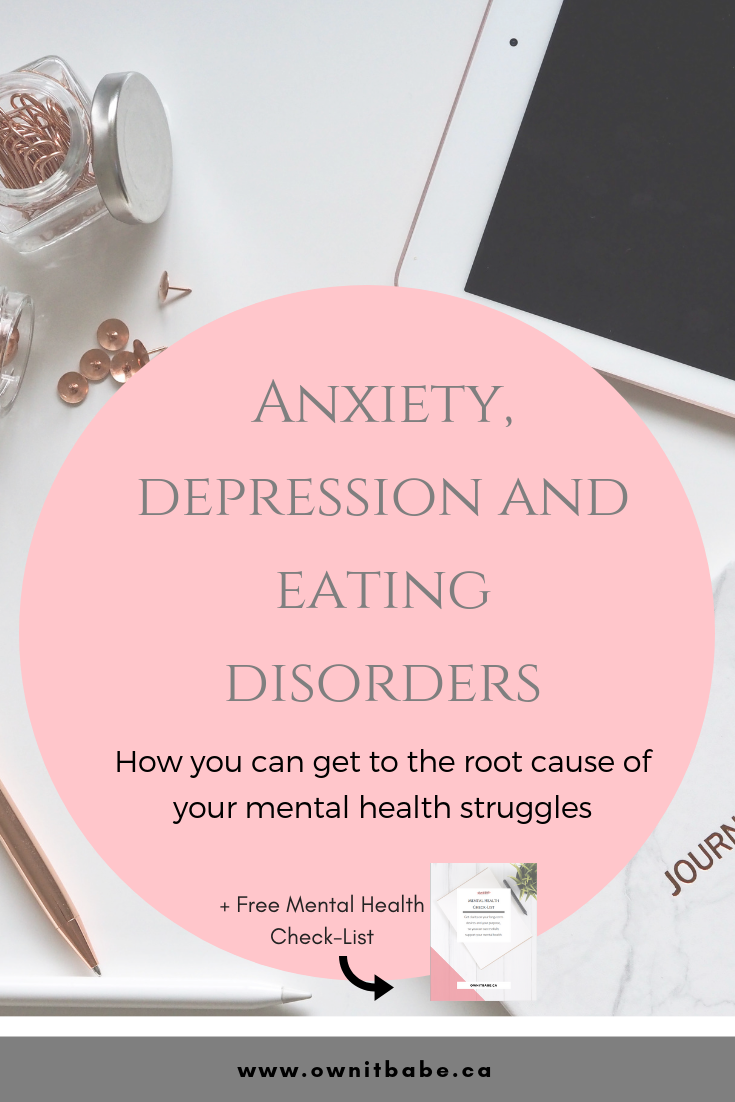
Is your Mental Health affecting your behaviours around food?
Sometimes I wonder… what came first for me? Was it my anxiety or my eating disorder?
I dove deep into researching the connection between mental health and disordered eating behaviors and it brought me a lot of clarity.
I want to pass my knowledge on to you, so you can understand:
-
- How my anxiety caused me to self-sabotage with food as a coping mechanism
-
- Why certain coping mechanisms can help us survive
-
- How to cope with mental health concerns in recovery
-
- Why you need to take care of your basic human needs to get to the root of your mental health struggles (and what those basic human needs are)
- How to come up with a long-term game plan to help you life a happier, more purposeful life

The beginning stages of my anxiety and my eating disorder
When I was 16 years old, somebody broke my heart. Back then I couldn’t truly understand what was happening and what made me feel this way.
Now I know, I was in love with this person and they chose someone else over me.
Someone, who was skinnier, had longer legs and different features than me.
I specifically remember how my heart sank when I heard the news and how I felt the overwhelming crippling feeling of despair.
I felt as if I couldn’t “control” the situation, because, well, my body wasn’t built to be skinny, have long legs, fair skin, a tiny nose and blue eyes.
In fact, I grew up in Germany – surrounded by blonde, tall, skinny, fair-skinned girls.
As a Greek girl with dark features, a shorter and broader frame and a family that was culturally different from my friends’ families, I never truly felt like I belonged.
Of course, this shouldn’t have been the case. Nonetheless, this is how I felt and I now understand how this may have caused a lack of belonging, as well as feelings of anxiety and the need to “control” certain situations.
Why my mental health issues caused me to engage in self-sabotaging behaviors around food
After I had my heart broken, I was convinced that if I made my body look different – skinnier – this would never happen to me again. Boys would choose ME over someone else.
Of course, my new habit of restricting food and exercising excessively didn’t go well for very long.
My body started rebelling and asking for more and more food.
I started having binge-eating episodes in secret, which I now know were caused by my restrictive behaviors around food.
Back then, I thought that I had simply lost all control and that I failed at trying to “belong”. That I had failed at looking like the other girls I hung out with.
My anxiety and depression got a lot more severe as a result. I truly believe our mental health and our disordered eating behaviours feed off each other. It was the case for me and many clients and students of mine.
So, what came first, the mental health concerns or my behaviours around food?
It’s hard to make a blanket statement for everybody, but in my case, I do believe that the anxiety came first.
In order to cope with this crippling feeling, I sought a coping mechanism that would bring me comfort.
It just wasn’t a coping mechanism that served me.
Are coping mechanisms as bad as their reputation?
No. We as humans use coping mechanisms to survive. We are trying to problem-solve, in order to stop feeling uncomfortable emotions.
Some coping mechanisms can be a life-saver for many people. Some exampled include seeking support, using humour, doing meditation and breathing exercises or moving our bodies.
Essentially, coping mechanisms are our human need to avoid feeling uncomfortable or negative.
However, dieting or developing certain behaviours around food can seem comforting at first, but it’s long-term effects on our mental health can be a lot worse. That is why I highly recommend seeking help, if you feel your behaviors around food are not serving you.
How to cope with anxiety or depression during eating disorder recovery
There are a lot of options in terms of support in recovery. Personally, I did a combination of talk therapy and anxiety medication, which was helpful temporarily. I also find the use of CBD oil to bring some relief for me.
However, in my opinion, the use of medication/natural substances is like a Band-Aid for the underlying feelings and emotions we have to work through, in order to get better.
It is vital to come up with a long-term plan to meet our basic human needs.
The basic human needs and how they affect our mental health
As human beings, we have certain physical and psychological needs, in order to feel healthy and at balance. These needs include water, shelter, food, but also human connection, belonging and having a purpose and meaning in life.
Feelings of loneliness, lack of connection and friends or working a job we perceive as meaningless can cause anxiety and depression. This article covers exactly why medication should be s short-term solution to an underlying issue that needs to be dealt with.
How I learned to cope
In order to cope with anxiety and depression during my eating disorder recovery, I found it to be extremely helpful to come up with a long-term plan. This plan brought relief and stopped me from feeling “stuck” and hopeless.
These are some questions I asked myself:
-
- How can I work towards creating more purpose in my life?
-
- Is there a way I can create deeper, more meaningful connections in my life?
-
- What are my long-term desires in life?
-
- If I could do anything for work, what would this be and how can I work towards achieving this?
-
- What is the root of my mental health concerns?
-
- When did it start and how can I get to the bottom of what is causing the feeling of anxiety and/or depression?
- What is my 5-year plan to work towards my biggest desires in life?
Remember that there is help and support out there. There is absolutely no shame in reaching out for help. You deserve to live a happy, purposeful life and YOU can make it happen.
***If you find yourself having scary thoughts and feeling as if your life is in danger, please call 1-800-273-8225 immediately. If you are not from the United States, click here to find your national suicide prevention hotline. There is hope and support available for you, so please make use of it.***



